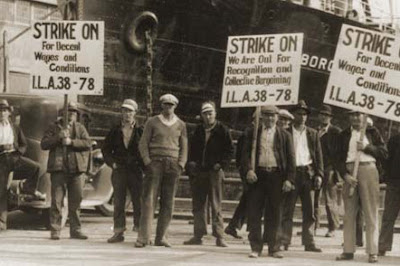The origins of a day honoring those who do the work of the world can
be traced to Chicago on May 1st, 1886. There was a general strike that day, led
by the Federation of Organized Trades and Labor Unions, pushing for an
eight-hour work day. At the time, regular shifts were from 10 to 16 hours a
day. If you were injured or killed on the job (which happened quite frequently)
there was no compensation. "If you can't work, buddy, then you starve."
On
May 4, there was a related labor rally held in Haymarket Square, in Chicago,
organized by several anarchist groups. When the rally was breaking up, someone threw a bomb.
Seven policemen were killed in the blast. The explosion touched off a police shooting
spree. No one knows how many were wounded or killed by the police.The bomber was never caught.
 |
| Haymarket Massacre |
As a
result of the bombing, eight anarchist labor leaders were jailed and put on
trial. Four of them weren’t even at the rally. Eventually, four were hanged on
dubious charges and a fifth killed himself in prison the night before his
hanging. Three spent six years in prison until pardoned by Illinois Governor
Altgeld, who declared that the state had, in the words of the prosecution, put
"Anarchy on trial,” in hopes that the executions would be the beginning of
the end of anarchist ideas in the US. And they were. The conception of
anarchists as crazy, bearded men with bombs became the reigning image throughout the 19th and 20th centuries.
On May 1st, 1890, the fourth anniversary of the Haymarket massacre, a group of
labor leaders met in Paris to establish the Second International. To these Europeans,
the executed Chicago radicals were revered martyrs. In an act of solidarity,
the Second International set May 1, 1890, as a day of protest. May 1st eventually evolved into International Worker’s Day around the globe. But not in the
US. It was too closely associated with radicals and the Haymarket massacre.
In 1893,
a national wave of bankruptcies plunged the US into a deep depression – resulting
in strikes across the nation. The Pullman Strike
started in Chicago in May 1894. President Grover Cleveland, a conservative
Democrat, was determined to crush the strike, but did not want to alienate the
American Federation of Labor, which was not yet involved in the Pullman
dispute. 1894 was a midterm election year and the Democratic Party did
not want to be seen as an enemy of labor. (They weren’t going to do anything
for workers, mind you, but they needed their votes…not much has changed).
 |
| Bloody Thursday Strike/July 5th, 1934/San Francisco |
Cleveland
and the Democrats hit upon a possible solution: They would proclaim a national
Labor Day to honor the worker. But not on May 1st– never on May 1st – MUST NOT
CHOOSE May 1st – because of its association with
socialists and anarchists and the Haymarket massacre and the radicals of the
Second International.
(Don’t pay them more money, don’t give them more protection
in the workplace…give them a holiday! It’s the American way!)
In September
1882, a few unions had begun to celebrate a Labor Day in New York City, and by
1894 the event had become an annual late-summer tradition in New York, adopted
by numerous states. Cleveland seized upon the September holiday as a way to
reward labor without connecting it to May Day. On June 28, 1894, Cleveland signed
an act of Congress establishing Labor Day as a federal holiday on the first
Monday of September.
Less
than a week later, the president sent federal troops into Chicago to crush the
Pullman strike.
 |
| AFSCME Sanitation Workers Strike/March 29, 1968/Memphis |
*
The Invisible Hand
For Michaela
1.
In the boutique grocery
store
I overheard talk of “spending the
summer in Marin.”
Shit,
we haven’t been anywhere in so long. It
must be
our own fault. The inability to
manifest
our destiny, crack open that elusive
money-chakra…
.
Coyote might be the
problem. You once said
“be lean
like Coyote” and the bastard must have overheard.
Then everything went
awry: capital on our trail: debt and debt;
one step forward, two steps back.
Or maybe everything went
right according to plan.
We are learning to serve.
(I’m not
bitter. I’m here because of a blown tire.)
2.
It’s blessedly
air-conditioned in here: rice from California,
cherries from Chile, flowers from Honduras.
Everything
fresh, ripe, bright.
I can feel The
Invisible-Hand-of-the-Market reach into my pants.
What holds this building
up? Who mined the copper?
Who picked the peppers?
A cheap tire costs less
than one week’s grocery run?
Everything has been stolen from something
or someone.
3.
It hasn’t rained in so
long.
Walking here I mistook the sound of
wind for water. I dream
of standing under
twisted elms, or in strange doorways,
listening to water gush down
empty streets
in a language I suddenly
know how to speak. It’s time
to
steal our life back. It’s time to turn our bed
into a riverbank den; rodent bones
strewn across the sheets.
*
 |
This poem was
previously published in 42opus under the title:
"For Michaela,
Who Can't Stand Work Anymore."
It is also in my
latest book:
All the Beautiful
Dead.
You can find it at
Small Press Distribution
here.
If you have no money
- and who does? -
ask your library to
order one.
It's simple.
It's fun.
It's also the
American Way.
All hail the free
libraries of America!
*
There's also a bitter
series I wrote on retail work and the service economy that you can find
Yeah, it'd be more
fun to watch "Dark Matter" or "Braindead"
(I love those
shows!),
but you never know,
it might be
interesting...
 |
| CWA strike against Verizon/April 15, 2016 |
No comments:
Post a Comment